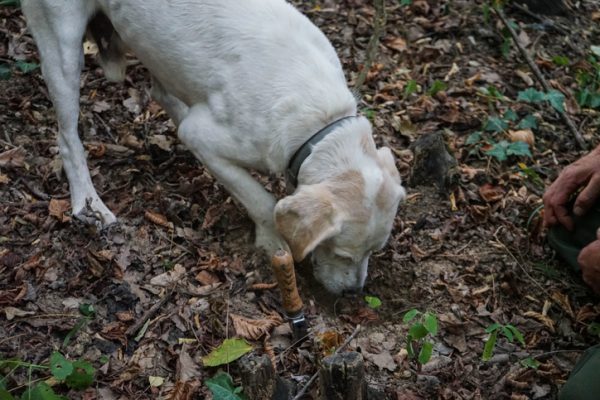
Did you know:
♦ Truffles are 80% water, so not surprisingly, they are the fruiting bodies of an underground web of fungi situated anywhere from one to six inches below the soil’s surface;
♦ They have a symbiotic relationship with the trees under which they’re found. Truffles wrap tiny “hairs” around the roots of the tree through which they get nutrients and carbs produced by photosynthesis. The truffle gives the tree water and minerals it gets from its own invisible hairs that can reach further into the ground than the tree’s own roots. While almost any tree can have this relationship, the most common families include Douglas fir, hazelnut, oak, pine and willow;
♦ Truffles have a distinct taste and odor treasured by gourmands and chefs….which is to say the gourmands and chefs who can afford them. Truffles are one of the most expensive foods in the world because they live inside tree roots found in specific kinds of soil, and thus are hard get. They can’t be cultivated, controlled, or farmed (it’s not like one can plant truffle seeds), and finding them can take an army of people and trained dogs because a single truffle hunting team can only find a few ounces, and it takes a lot of people to get the quantity needed. All those employees drive up prices, as does the fact that truffles are seasonal. For anyone wondering, black truffles, the most common variety, currently costs about $95/ounce, while white truffles can cost $168/ ounce, and European white truffles run $3,600 a pound. And that was before today’s economy. There are actual Truffle price trackers, here is one of them, and you’ll have to do some conversions, the prices are listed in Euros.
Those prices are peanuts compared to what the rare Mediterranean black truffle costs: Plan on shelling out $1,030 for just 16 ounces. Back in 2017, a black Labrador Retriever named “Ciska” helped make big gastronomic news when she sniffed out Mediterranean black truffles. The fungi had been cultivated in the United Kingdom for the first time by researchers from the University of Cambridge and Mycorrhizal Systems Ltd. collaborating with local farmers. The team waited nine years until Ciska helped researchers harvest the fungus. More on that story from 2017 here.
In 1985, an Italian law was passed regarding truffle hunting. It stipulated that only trained dogs could be used (no breed specified), as well as a specific digging tool called a “vanghino” or “vanghetto.”
The Lagotto Romagnolo is famous as a truffle hunter. While the Lagotto is the most popular truffle-hunting dog in Europe, and, in fact, is the official truffle-hunting dog of Italy, other breeds can be trained to find truffles (and not eat them) as long as one has the time to invest in it: Training a dog to be a professional truffle hunter can take up to four months, or longer. Anyone who wants to buy a dog already trained for the work can expect to pay in the six figures. That said, breeds besides the Lagotto that shine at detection work often do well in truffle hunting, as do sporting breeds like the Labrador Retriever. We have also heard of Miniature Poodles and Dachshunds finding success as truffle dogs.
There are organizations that help train dogs to hunt down “black gold” including The Truffle Underground and Truffle Dog Company. There are also breeders who breed specifically for truffle hunting, They often training early by smearing a bit of truffle oil on the mother’s belly to familiarize puppies with the scent. Doing this helps a pup associate the smell with something positive, i.e., Mom. Later, the pups will play with toys containing truffles, and later still, look for those toys that have been buried. Games advance until the pup goes into the field for the real thing.
At over $1,000 a pound, perhaps truffle hunting is a new career for some of us.
Image of “Rocky” (not Ciska who is a black Labrador Retriever) searching for truffles research in La Morra, Italy – by Coscarella Gianfranco/iStockPhotos
